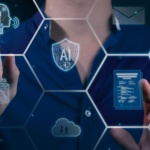Summary
AI is revolutionizing the ecommerce landscape by enhancing mobile optimization, targeted marketing, personalized experiences and logistics. From mobile-friendly design to AI-powered chatbots and recommendation systems, businesses are leveraging AI to improve customer engagement and streamline operations.
In today’s dynamic ecommerce landscape, the integration of AI technologies is reshaping the way we shop online. We’ve put together a guide on how AI is impacting ecommerce businesses, from personalized experiences to streamlined logistics, to help you understand how to stay ahead in the increasingly competitive market.
Key Takeaways:
- Leverage AI for mobile optimization and online discovery by including personalized shopping experiences, virtual assistants, chatbots and many more tools to enhance accessibility and customer engagement.
- Google, Meta and social media platforms utilize AI algorithms for targeted marketing and integrate AI-powered recommendation systems to facilitate seamless purchases.
- AR/VR technologies use AI for product visualization and personalized try-on experiences, enhancing customer engagement and driving sales.
- Revamped delivery and returns employ AI for efficient logistics management, real-time tracking and personalized delivery options, improving overall convenience for shoppers.
Focus on Mobile-First Ecommerce Experiences
With more consumers shopping on mobile, marketers must optimize the mobile experience for their consumers; here is how AI can improve the mobile-friendliness of your site:
- Design optimization: AI can analyze user behavior to adjust your site’s layout for better responsiveness, viewing and interaction from consumers.
- Personalized user experience: AI can give tailored product recommendations from your site based on a user’s previous preferences and browsing history.
- Performance optimization: monitoring done by AI can track your mobile site’s performance, optimize load time and content delivery to users.
- Predictive analytics for inventory management: AI forecasts can determine product demand based on historical data and trends, which allows your site to have better inventory management and stock availability.
Verizon provides their customers with personalized experiences based on their site behavior. Based on customers’ responses to certain messaging, their location, what time of day they are active and triggers them, such as sales or discounts, Verizon then decides what personalized messaging they will receive, such as different versions of their website.

In this search result, Verizon is displayed using the customer’s location and appeals to the customers need by automatically showcasing a deal.
Online Discovery Through AI
Not only does AI analyze and help create better mobile infrastructure for your site, but it also offers on-site features that help improve the customer shopping experience. Here are some AI-powered tools you can add to your site to increase customer interaction and satisfaction:
- Voice search optimization: AI-powered language processing models can allow consumers to voice search for products or questions rather than typing.
- Visual search: AI visual search technology allows users to find products on your site using images they have on their mobile device or computer.
- Chatbots: On-site chatbots powered by AI provide consumers with real-time assistance, guiding users through the shopping journey while addressing inquiries or concerns promptly.

Best Buy offers customer support through an AI-powered chatbot.
To learn how you can craft a journey for consumers through AI, attend the session “Levering AI Across the Customer Journey” at the 2024 CommerceNext Growth Show this June 11-13.
Utilizing AI Algorithms for Targeted Marketing
Search engines and social media are powerful platforms that utilize AI for targeted marketing. Google uses AI to research consumers’ behavior to target certain ads based on previous searches or purchases. For marketers, this means that ads can easily reach a target audience.
There’s probably not a day that goes by when you don’t hear about TikTok; it has fundamentally changed how ecommerce and retail businesses operate, meaning marketers need to keep up with these trends.
TikTok AI algorithms can quickly boost your content to millions of viewers. Within the TikTok platform, AI algorithms analyze user interactions and preferences to deliver targeted content. Therefore, it’s important to create TikTok and short-form video content that appeals to your audience’s needs and values. If it does, you have the opportunity to utilize algorithms that will boost your content and maximize engagement.
TikTok AI algorithms also power recommendation systems that analyze user’s past purchases and interests. These recommendation systems allow users to view, discover and purchase products directly from their feeds.

Walgreens is just one brand utilizing TikTok’s algorithms. In this sponsored post, viewers have the option to click the “Shop now” button to purchase the product.
This isn’t just exclusive to TikTok though. AI algorithms throughout all social media platforms can help your ecommerce brand reach audiences. This can be seen in Meta’s shopping pages with targeted products displayed to consumers. This targeted approach can show just how powerful AI algorithms can be for ecommerce brands.
AR/VR for Personalized Engagement
Virtual try-on tools can allow customers to “try on” before buying and are especially popular in the cosmetics and fashion industries. This can include shade-matching for cosmetic brands and trying on clothes for apparel brands. Additional retail brands have utilized AR for customers to envision what a product would look like in their home, office or personal space.

Wayfair utilizes AR technologies for viewers to visualize what new pieces of furniture will look like in their homes.
But it doesn’t end here, AI tools can analyze user preferences and facial features to provide personalized recommendations that further enhance customer experience. Additionally, AI algorithms optimize AR/VR content delivery across different devices to ensure smooth performance and realistic visualization of products for users.

Ulta Beauty is a top brand using AR/VR for personalized engagement. Users can use the “GLAMlab” feature to try on products, shade match and receive product recommendations.
Revamped Delivery and Returns for Enhanced Convenience
AI-powered logistics optimization algorithms can help streamline delivery routes, in turn reducing shipping times and improving overall efficiency for the delivery process.
Online returns can often be difficult for consumers. However, AI-powered logistics can help ease the product return process. AI-driven customer service can personalize customer assistance and support them through the return process. With this, AI can help ensure a hassle-free return experience for shoppers.
Looking for more content on AI? Register for the upcoming 2024 CommerceNext Growth Show, June 11-13 in NYC; with 10+ sessions covering AI, you’ll learn from industry experts about innovative AI-driven strategies for marketing and ecommerce success.
Related Posts
-
Ecommerce SEO Uncovered: 5 Proven Strategies for Online Dominance
Optimizing SEO is pivotal for driving traffic and sales, and…
-
Unlock Your Year With AI: The Playbook for Ecommerce
In 2024, you have to make an impact with AI.…
-
New Study Reveals 42% of Online Retailers Plan Further Technology Investment in 2024
CommerceNext Survey Also Shows Majority of Ecommerce Enterprises Are Optimistic…
-
New Study Reveals 42% of Online Retailers Plan Further Technology Investment in 2024
CommerceNext Survey Also Shows Majority of Ecommerce Enterprises Are Optimistic…
-
Emerging Ecommerce Trends that Led 2022
This past year has been a whirlwind of adjusting to…
-
Ecommerce SEO Uncovered: 5 Proven Strategies for Online Dominance
Optimizing SEO is pivotal for driving traffic and sales, and…





